PREMIUM NEWSLETTER | ISSUE #8
This week’s newsletter:
 ︎ 1. Editor’s Note – Alternate realities
︎ 1. Editor’s Note – Alternate realities
 ︎ 2. What’s Trending – A closer look at the top stories
︎ 2. What’s Trending – A closer look at the top stories
 ︎ 3. What to Know – Highlighting hot topics
︎ 3. What to Know – Highlighting hot topics
 ︎ 4. What Lies Behind – The human ‘Sorting Hat’
︎ 4. What Lies Behind – The human ‘Sorting Hat’
 ︎ 5. What’s Noteworthy – An inappropriate selfie
︎ 5. What’s Noteworthy – An inappropriate selfie
 ︎ 6. What’s Popular – White People Food
︎ 6. What’s Popular – White People Food
 ︎ 7. What’s Memorable – Best reads from the archive
︎ 7. What’s Memorable – Best reads from the archive
 ︎ 8. Weibo Word of the Week – “Small-town upper class”
︎ 8. Weibo Word of the Week – “Small-town upper class”
Dear Reader,
In the social media era, news travels farther, faster, and deeper than ever before. Although so-called ‘cyber utopians’ may have wished and believed that this would lead to freer and more democratic dynamics in the world of news media, we are now witnessing how news platforms are actually also contributing to increased polarization and frustration among people.
While this may hold true for the global news environment at large, this phenomenon is recently particularly noteworthy in China, where online anger over the lack of recognition and representation in news reports has become prevalent.
With 1 in 5 young Chinese currently facing joblessness, many students and graduates are worried because of the instability that is permeating throughout a society where youth unemployment is a growing problem. The pressure to choose a major that offers a high chance of finding a good job is palpable, with over 88% of young people expressing the wish for guidance in this stressful process.
In response, some students have taken to the Chinese social media platform Xiaohongshu to post creative graduation photos, portraying themselves as zombies, runaways, or even dead people, as a way to mock the challenges they have faced and anticipate in the future. One recent graduate sarcastically wrote, “Graduation! Going from being graduated to being unemployed.”
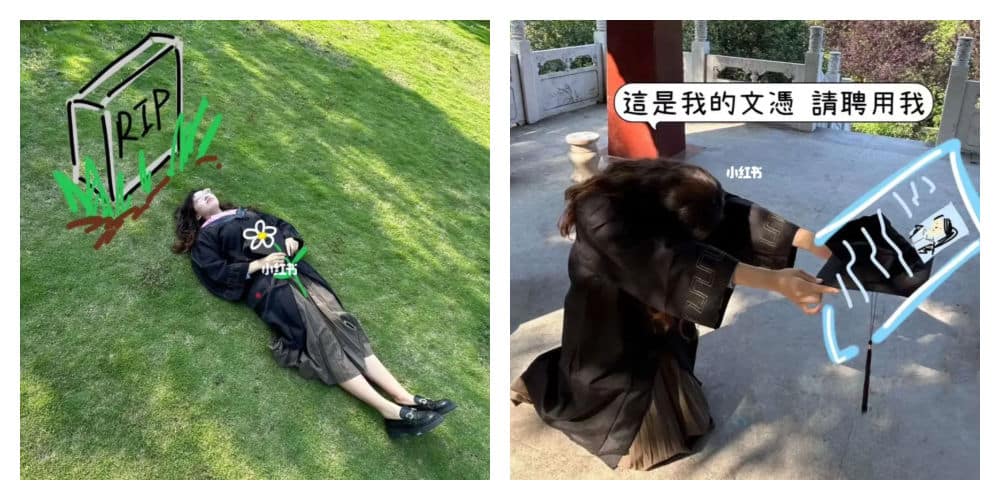
Creative graduation photos.
However, when these students scroll through their newsfeeds, they encounter a very different narrative: positive prospects for youth, news of 26 million young graduates finding jobs, and encouragement to pursue their passions. Rather than finding solace in these rose-colored reports, many are growing increasingly skeptical of Chinese journalism and media tactics that seem to create alternate realities. One person wondered, “Is it really so difficult to acknowledge the ’employment recession’?”
In light of these discussions and recent criticisms of Chinese media reports that clash with everyday realities, it is perhaps not surprising that when needing to pick a major, many people feel that studying journalism is not the road to take. An online debate about this topic has recently garnered millions of views.
Meanwhile, a distrust in mainstream media also does not help when disaster happens. After the deadly explosion that occurred in Yinchuan last week, erroneous reporting by some state media outlets led people to accuse them of purposely spreading “fake news.”
All of these incidents further fuel the ongoing discussions about the current state and future of journalism and news media in China. To delve deeper into these topics and more, please explore our latest stories below. This week’s newsletter includes contributions from Miranda Barnes and Zilan Qian.
Best,
Manya
What’s Trending
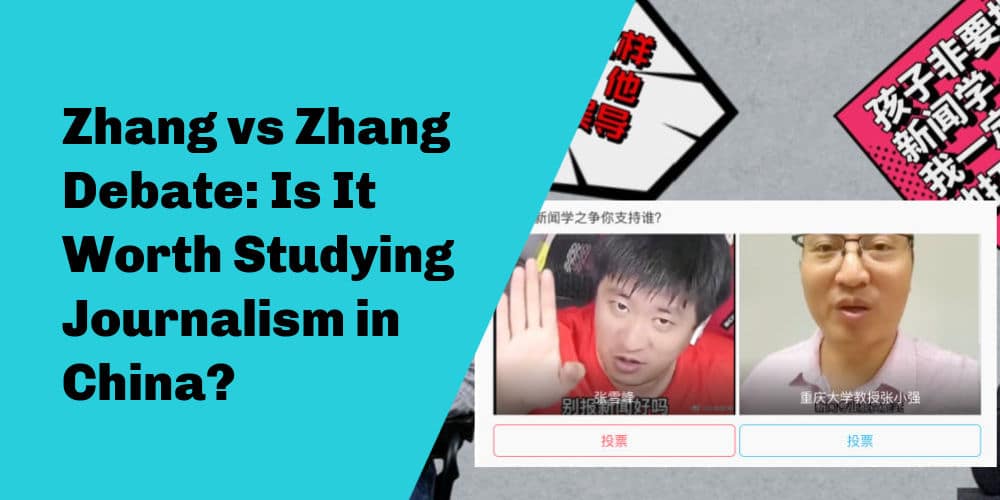
1: Criticism of Journalism in China | Chinese educational internet influencer Zhang Xuefeng (张雪峰) recently sparked a trending discussion by strongly discouraging Chinese youth from pursuing a degree in journalism. While scholars and state media emphasize the merits of studying journalism, a significant number of netizens question its benefits, labeling it as impractical, uneducational, and restrictive. Professor Zhang Xiaoqiang (张小强), on the other hand, argues that pursuing a degree in journalism is worth it. Meanwhile, the ‘Zhang vs Zhang’ online debate has captivated millions of people.
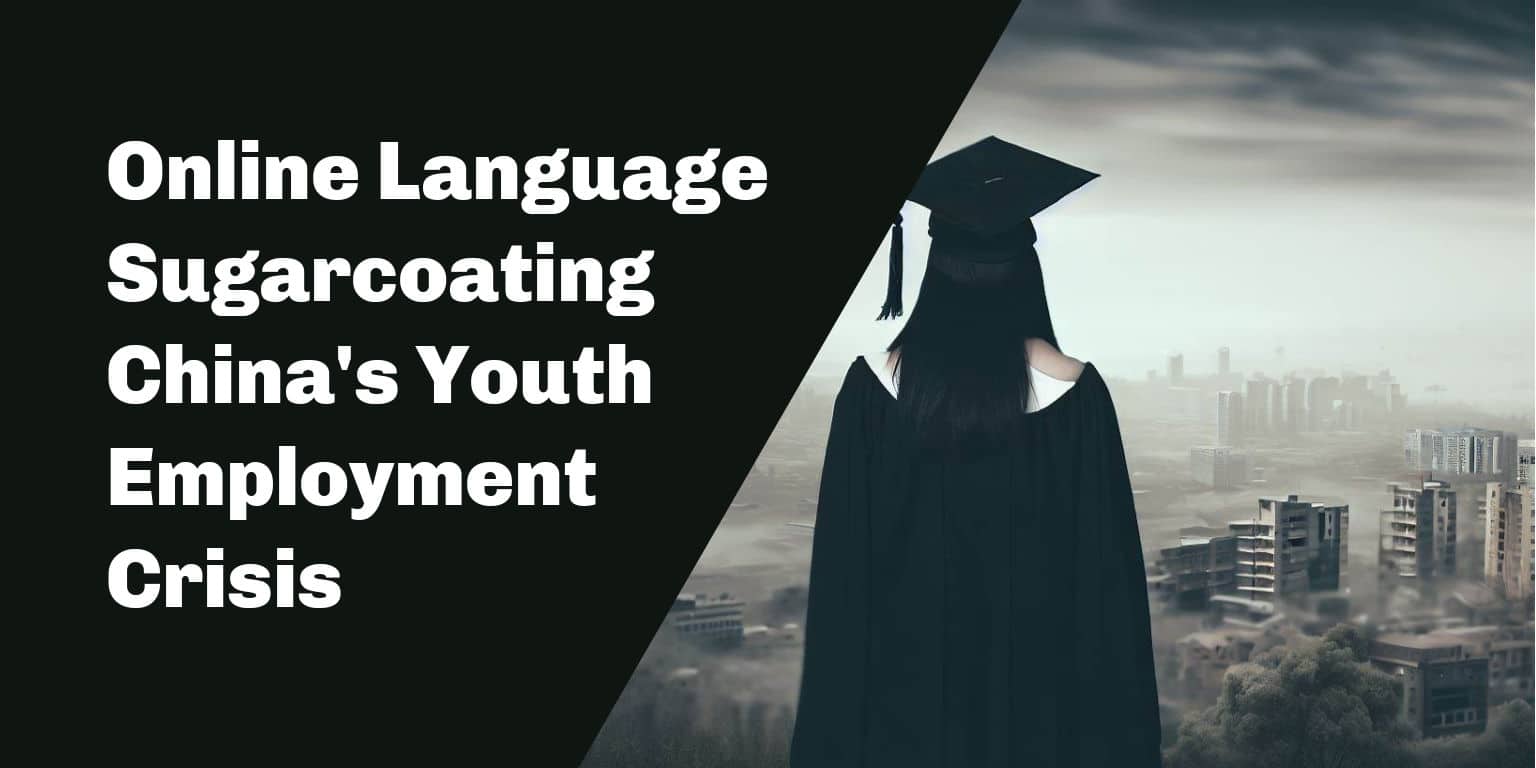
2: Different Realities | From manipulating employment statistics to the use of euphemistic terms, Chinese netizens are growing increasingly frustrated about how official media and authorities are portraying the situation on the job market. As one in five young Chinese faces joblessness, this article highlights how Chinese youth are growing weary of reading positive news reports about the job market’s prospects, which sharply contrast with the challenging realities they face themselves.

3: The Wagner Mutiny on Chinese Social Media | The recent developments involving Putin and the Wagner group have gained significant attention in China’s media landscape, with a Russia-focused perspective dominating the online discussions. While some Chinese netizens express support for Russia, there is also a notable segment that mocks and ridicules staunch pro-Russia supporters, labeling them as ‘Yellow Geese’. This article was written on June 24, recording the Chinese responses to the Wagner mutiny situation as it unfolded.

4: Failing Safety Measures | The tragic gas explosion at a BBQ restaurant in Yinchuan, Ningxia, resulting in the loss of 31 lives and injuring 7 others, has had a profound impact on the local community. Following the incident, many customers at local (bbq) restaurants choose to sit outside, reflecting an increased awareness about the dangers of gas leakage and the importance of good ventilation. However, the impact extends beyond the immediate community. During the Dragon Boat Festival holiday, local authorities across the country, in accordance with Xi Jinping’s instructions, are intensifying safety controls and reinforcing supervision to prevent a recurrence of such an incident, which could have been easily avoided with appropriate safety measures.
What to Know
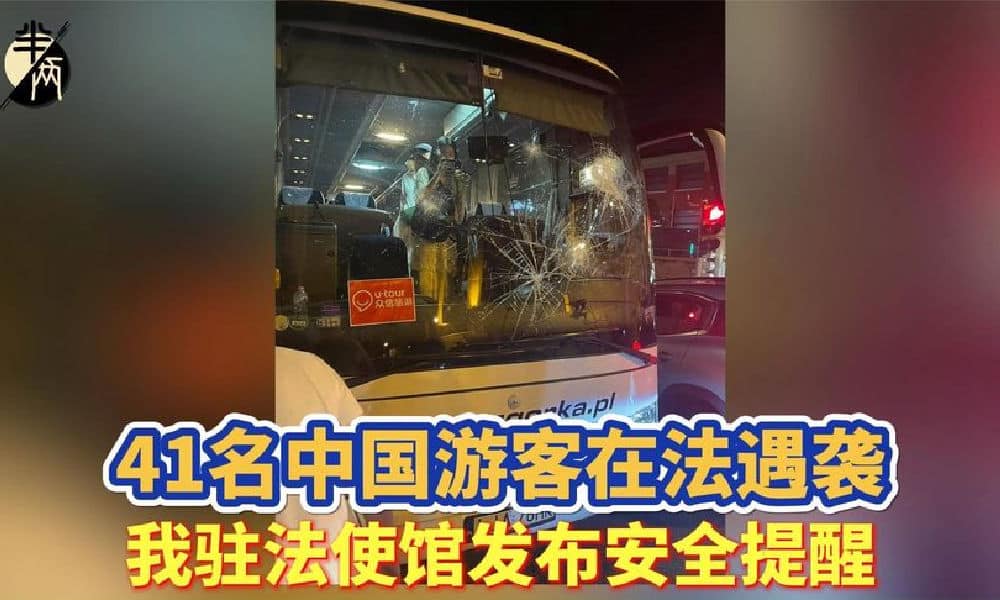
A Chinese tour group was attacked during the riots in France.
 ︎ Riots in France. This weekend, after days of unrest, the riots and chaos in France have also reached the top trending topic lists of Chinese social platforms, including Weibo, where the hashtag “The French Riots Have Spread to Neighboring Belgium” (#法国骚乱已蔓延到邻国比利时#) was among the biggest topics of the day on Saturday. Protests and riots have escalated in France, from Paris and Marseille to Lyon, following the fatal police shooting of a 17-year-old male that occurred during a traffic stop on Tuesday in the Paris suburb of Nanterre. The situation in France is major news in Chinese media, especially after a bus carrying a Chinese tour group had its windows smashed in Marseille, resulting in several minor injuries. Chinese authorities have issued a warning for Chinese citizens in France to take precautions and stay safe in light of the recent unrest. (Hashtag: Chinese citizens in France Should Increase Safety Measures #在法中国公民加强安全防范#, 7.5 million views; “France Continues Seeing Riots in Various Places” #法国多地持续发生骚乱#, 7.4 million views; “Over 40 Chinese Travelers Attacked in France” #40多名中国游客在法遇袭#, 9.1 million views).
︎ Riots in France. This weekend, after days of unrest, the riots and chaos in France have also reached the top trending topic lists of Chinese social platforms, including Weibo, where the hashtag “The French Riots Have Spread to Neighboring Belgium” (#法国骚乱已蔓延到邻国比利时#) was among the biggest topics of the day on Saturday. Protests and riots have escalated in France, from Paris and Marseille to Lyon, following the fatal police shooting of a 17-year-old male that occurred during a traffic stop on Tuesday in the Paris suburb of Nanterre. The situation in France is major news in Chinese media, especially after a bus carrying a Chinese tour group had its windows smashed in Marseille, resulting in several minor injuries. Chinese authorities have issued a warning for Chinese citizens in France to take precautions and stay safe in light of the recent unrest. (Hashtag: Chinese citizens in France Should Increase Safety Measures #在法中国公民加强安全防范#, 7.5 million views; “France Continues Seeing Riots in Various Places” #法国多地持续发生骚乱#, 7.4 million views; “Over 40 Chinese Travelers Attacked in France” #40多名中国游客在法遇袭#, 9.1 million views).
 ︎ CPC Founding Anniversary. This week, there have been numerous hashtags related to the Communist Party on Chinese social media platforms as the 102nd anniversary of the CPC’s founding was celebrated on Saturday. The anniversary received significant attention online, with a multitude of images, videos, and official posts praising the Party and emphasizing the goals of national prosperity and rejuvenation. Offline celebrations included a symphony concert in Beijing and the release of multilingual editions of “A Concise History of the Communist Party of China.” According to official media reports, the number of Party members has reached 98.04 million, marking a 1.4% increase compared to the previous year. (Hashtag: “The 102nd Anniversary of the Founding of the Communist Party of China” ##中国共产党成立102周年#
︎ CPC Founding Anniversary. This week, there have been numerous hashtags related to the Communist Party on Chinese social media platforms as the 102nd anniversary of the CPC’s founding was celebrated on Saturday. The anniversary received significant attention online, with a multitude of images, videos, and official posts praising the Party and emphasizing the goals of national prosperity and rejuvenation. Offline celebrations included a symphony concert in Beijing and the release of multilingual editions of “A Concise History of the Communist Party of China.” According to official media reports, the number of Party members has reached 98.04 million, marking a 1.4% increase compared to the previous year. (Hashtag: “The 102nd Anniversary of the Founding of the Communist Party of China” ##中国共产党成立102周年#
#, more than 290 million views on Weibo by Sunday evening, local time).
 ︎ Cai Xukun Controversy. Chinese singer-songwriter Can Xukun has been all the talk this week after getting caught up in a scandal. Allegations surfaced claiming that Cai had a one-night stand with a woman who later became pregnant, and he allegedly requested her to undergo an abortion. Cai is a major celebrity, as well as brand ambassador of global brands including Prada, Givenchy, and Tag Hauer. As the scandal is unfolding, it is not yet sure how this will impact the singer’s career, but his name was already removed from the Douban pages of some variety shows in which he participated, and CCTV allegedly has also taken down online videos of him. (Hashtag: “Cai Xukun and Forced Abortion of Ms. C” ##蔡徐坤 c女士打胎#, 2.9 billion views on Weibo).
︎ Cai Xukun Controversy. Chinese singer-songwriter Can Xukun has been all the talk this week after getting caught up in a scandal. Allegations surfaced claiming that Cai had a one-night stand with a woman who later became pregnant, and he allegedly requested her to undergo an abortion. Cai is a major celebrity, as well as brand ambassador of global brands including Prada, Givenchy, and Tag Hauer. As the scandal is unfolding, it is not yet sure how this will impact the singer’s career, but his name was already removed from the Douban pages of some variety shows in which he participated, and CCTV allegedly has also taken down online videos of him. (Hashtag: “Cai Xukun and Forced Abortion of Ms. C” ##蔡徐坤 c女士打胎#, 2.9 billion views on Weibo).
 ︎ Bullied High School Student Commits Suicide. The case of a 16-year-old high school student in Guizhou who recently died by suicide after ingesting poison at the school campus has gained significant attention on Chinese social media. According to reports, the student had been subjected to bullying at school. Earlier this year, he was caught selling cigarettes and had reported his classmates for using smartphones. The bullying he experienced became increasingly severe, causing him to develop fear of returning to school and leading to a decline in his mental health. Following his death, his mother shared his story on social media. This incident has sparked greater awareness about the issue of bullying in Chinese schools, prompting various state media outlets to publish articles aimed at helping parents detect signs of bullying in their children’s lives. (Hashtag: “16-Year-Old High School Student Dies by Suicide after Ingesting Poison on Campus” ###16岁中学生校内服毒自杀身亡#, 180 million views on Weibo).
︎ Bullied High School Student Commits Suicide. The case of a 16-year-old high school student in Guizhou who recently died by suicide after ingesting poison at the school campus has gained significant attention on Chinese social media. According to reports, the student had been subjected to bullying at school. Earlier this year, he was caught selling cigarettes and had reported his classmates for using smartphones. The bullying he experienced became increasingly severe, causing him to develop fear of returning to school and leading to a decline in his mental health. Following his death, his mother shared his story on social media. This incident has sparked greater awareness about the issue of bullying in Chinese schools, prompting various state media outlets to publish articles aimed at helping parents detect signs of bullying in their children’s lives. (Hashtag: “16-Year-Old High School Student Dies by Suicide after Ingesting Poison on Campus” ###16岁中学生校内服毒自杀身亡#, 180 million views on Weibo).
 ︎ Renmin University Students’ Information Leak On July 1st, a post on social media claimed that a graduate student from Renmin University of China stole students’ personal information to create a “girl rating site” to score their attractiveness based on facial features. The leaked information allegedly includes student ID numbers, names, colleges, hometowns, and birthdays. The topic has gained widespread attention on social media, where the topic is currently still developing. The incident has been reported to police and is still under investigation. (Hashtag: “Renmin University Student Information Leak Incident” #人民大学通报学生信息泄露事件#, 64 million views on Weibo).
︎ Renmin University Students’ Information Leak On July 1st, a post on social media claimed that a graduate student from Renmin University of China stole students’ personal information to create a “girl rating site” to score their attractiveness based on facial features. The leaked information allegedly includes student ID numbers, names, colleges, hometowns, and birthdays. The topic has gained widespread attention on social media, where the topic is currently still developing. The incident has been reported to police and is still under investigation. (Hashtag: “Renmin University Student Information Leak Incident” #人民大学通报学生信息泄露事件#, 64 million views on Weibo).
 ︎ Biden Calling Xi “Dictator”. Following Blinken’s recent visit to China, President Biden referred to Chinese leader Xi Jinping as a “dictator” during a campaign fundraiser in California. This statement gained international attention, with China’s Foreign Ministry accusing the US president of “political provocation” in response. However, the incident received minimal coverage on Chinese online media platforms. Interestingly, the only relevant Weibo hashtag regarding a leader being called a “dictator” was in reference to a graphic aired on Fox News during Trump’s post-arrest speech, where Biden was labeled a “wannabe dictator.” (Hashtag: “Trump Labels Biden as Wannabe Dictator” ##特朗普称拜登想成为独裁者#).
︎ Biden Calling Xi “Dictator”. Following Blinken’s recent visit to China, President Biden referred to Chinese leader Xi Jinping as a “dictator” during a campaign fundraiser in California. This statement gained international attention, with China’s Foreign Ministry accusing the US president of “political provocation” in response. However, the incident received minimal coverage on Chinese online media platforms. Interestingly, the only relevant Weibo hashtag regarding a leader being called a “dictator” was in reference to a graphic aired on Fox News during Trump’s post-arrest speech, where Biden was labeled a “wannabe dictator.” (Hashtag: “Trump Labels Biden as Wannabe Dictator” ##特朗普称拜登想成为独裁者#).
 ︎ 5-Year-Old Jumps From 5th Floor after Parental Abuse. On June 25, a distressing incident unfolded as a 5-year-old boy attempted to escape physical abuse from his parents by climbing out of the window of their 5th-floor apartment in Changfeng County. Shockingly, instead of ensuring her son’s safety, the mother resorted to further violence, striking the young boy with a stick, ultimately leading to the young boy’s jump/fall. Neighbors who saw the incident unfold immediately alerted authorities, and the child was swiftly transported to the hospital, where he is currently receiving medical treatment and is reported to be out of immediate danger. The incident has sparked widespread discussions about the detrimental effects of parental abuse, with some critics also questioning media reports that suggested the mother had used the stick to coerce the child back inside. As the investigation is ongoing, local authorities are appealing to the public to refrain from sharing a circulating video of the incident, emphasizing the importance of safeguarding the child’s well-being. (Hashtag: “Police Report Regarding Boy Jumping from Building Incident” ##警方通报男童坠楼事件#).
︎ 5-Year-Old Jumps From 5th Floor after Parental Abuse. On June 25, a distressing incident unfolded as a 5-year-old boy attempted to escape physical abuse from his parents by climbing out of the window of their 5th-floor apartment in Changfeng County. Shockingly, instead of ensuring her son’s safety, the mother resorted to further violence, striking the young boy with a stick, ultimately leading to the young boy’s jump/fall. Neighbors who saw the incident unfold immediately alerted authorities, and the child was swiftly transported to the hospital, where he is currently receiving medical treatment and is reported to be out of immediate danger. The incident has sparked widespread discussions about the detrimental effects of parental abuse, with some critics also questioning media reports that suggested the mother had used the stick to coerce the child back inside. As the investigation is ongoing, local authorities are appealing to the public to refrain from sharing a circulating video of the incident, emphasizing the importance of safeguarding the child’s well-being. (Hashtag: “Police Report Regarding Boy Jumping from Building Incident” ##警方通报男童坠楼事件#).
 ︎ Dragon Boat Travel Rush. According to data from China State Railway Group, China’s railway passenger flow reached a record high during the recent Dragon Boat Festival holiday, which started on Thursday last week. Approximately 70.38 million railway passenger trips were made nationwide during a five-day period, which is an increase of 7.14 million compared to the 2019 holiday. On June 22, a single-day record was set with 16.09 million passenger trips.
︎ Dragon Boat Travel Rush. According to data from China State Railway Group, China’s railway passenger flow reached a record high during the recent Dragon Boat Festival holiday, which started on Thursday last week. Approximately 70.38 million railway passenger trips were made nationwide during a five-day period, which is an increase of 7.14 million compared to the 2019 holiday. On June 22, a single-day record was set with 16.09 million passenger trips.
What’s Behind the Headlines
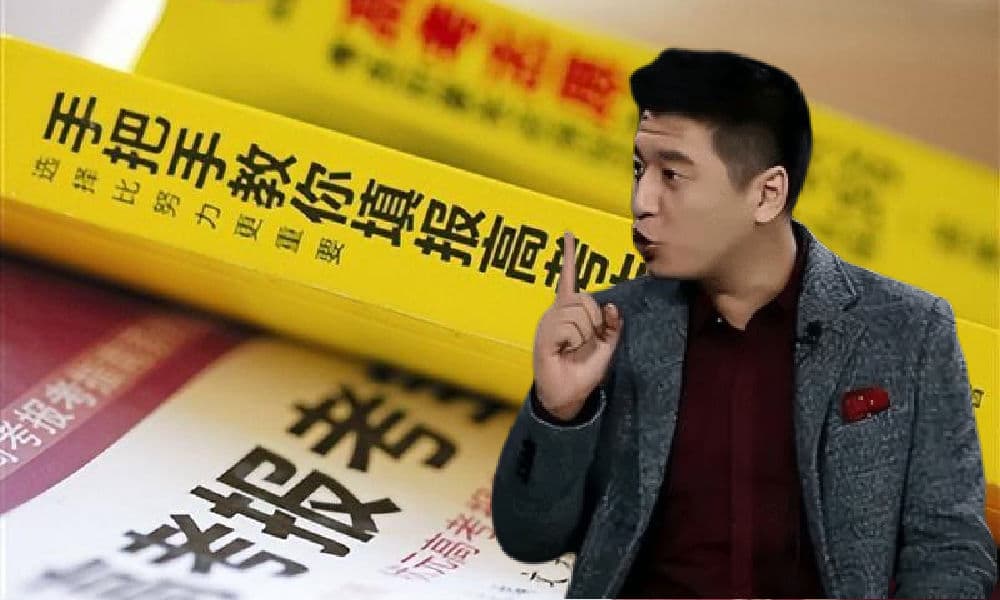
The Human Version of the Sorting Hat: Choosing a Promising Path
After the brief celebration of wrapping up the Gaokao, the university entrance exams in China, hundreds of thousands of students received their results this week and embarked on the next step of their academic journey: submitting their choices of major and university. Faced with immense pressure and a wealth of information, students are turning to consulting services to help them make decisions that are crucial for their future. With an overwhelming 88.1% of Chinese students indicating their willingness to utilize such services, it has become a thriving industry.
One prominent figure in this field is Zhang Xuefeng, an influential education advisor known for providing practical guidance based on various factors, including a student’s Gaokao performance, personal interests, and family background. Zhang has earned the nickname “Human Sorting Hat” (人肉分院帽) for his role in guiding students towards suitable choices, similar to the magical hat in the Harry Potter series.
Although Zhang and advisers like him are increasingly popular, an editorial piece recently published state media outlet People’s Daily criticized the industry for offering purely utilitarian advice, suggesting that there is more to life than simply “getting a job” or “supporting one’s family,” and that dreams should also be taken into account.
Nonetheless, many commenters support Zhang’s approach, arguing that in today’s society and economy, individuals from ordinary families literally cannot afford to make missteps when making life-altering decisions. “I wish I had his advice back in the day,” one person remarked: “I wouldn’t have wasted four years studying something unrelated to my current job.”
What’s Noteworthy
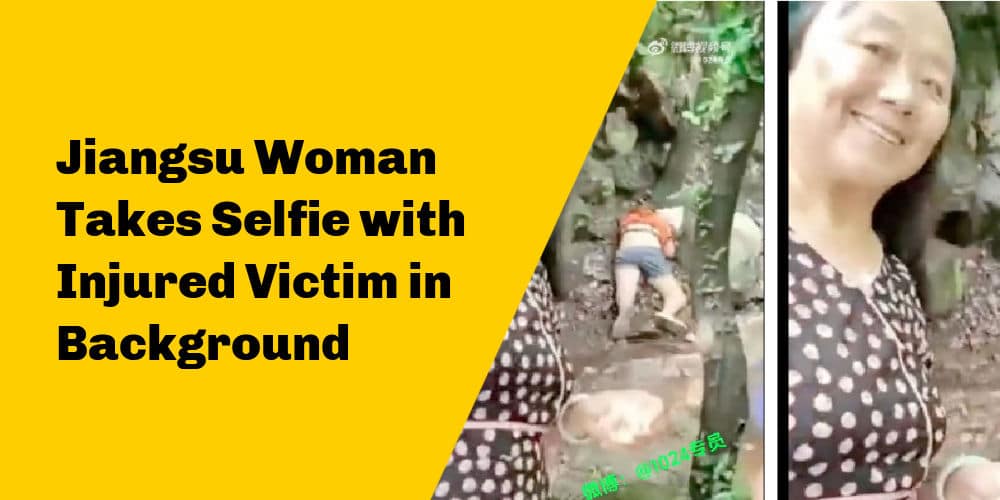
A Very Inappropriate Selfie | A notable trending topic emerged on Douyin and in the “society” category on Weibo over the past weekend, concerning a Chinese woman who took a tourist photo in a rather inappropriate setting. The incident took place in Wuxi, Jiangxi Province, where a Chinese domestic tourist reportedly slipped and fell into a ditch while recording a Douyin (TikTok) video during her visit to the scenic water area at Xihui Park. Following her fall, the woman lay motionless in the ditch, face down.
What made the incident controversial was that another woman, who did not even know if the victim was dead or alive, treated the scene as if it were a tourist attraction. She proceeded to take a smiling selfie while standing near the woman in the ditch. This behavior raised questions about the woman’s lack of empathy and sparked discussions about the problematic side of the social media era. Some individuals seem to prioritize their own self-presentation on socials, forgetting to to show empathy those around them.
What’s Popular

They Discovered Our Trend! | Earlier this month, the term ‘white people food’ (白人饭 báirénfàn) gained significant attention in English-language media after it became a trend on the Chinese social media platform Xiaohongshu. “White people food” mainly refers to simple meals that are easy to prepare, prioritizing convenience over taste. Examples include crackers and cheese, celery with dip, boiled egg with cucumber, ham sandwiches, or pasta with tomatoes.
Mocking unappetizing, cold, and barely seasoned ‘white people food’ became popular among overseas Chinese posting photos on Xiaohongshu and others criticizing the bland lunchboxes brought to work by white colleagues. As a response to the trend, an online challenge emerged where people attempted to recreate their own version of a white people lunch. This mini-trend caught the attention of English-language media outlets, including Buzzfeed. A month after the ‘white people food’ trend first became popular, Chinese netizens onw reflect on how the trend gained international attention.
What’s Memorable
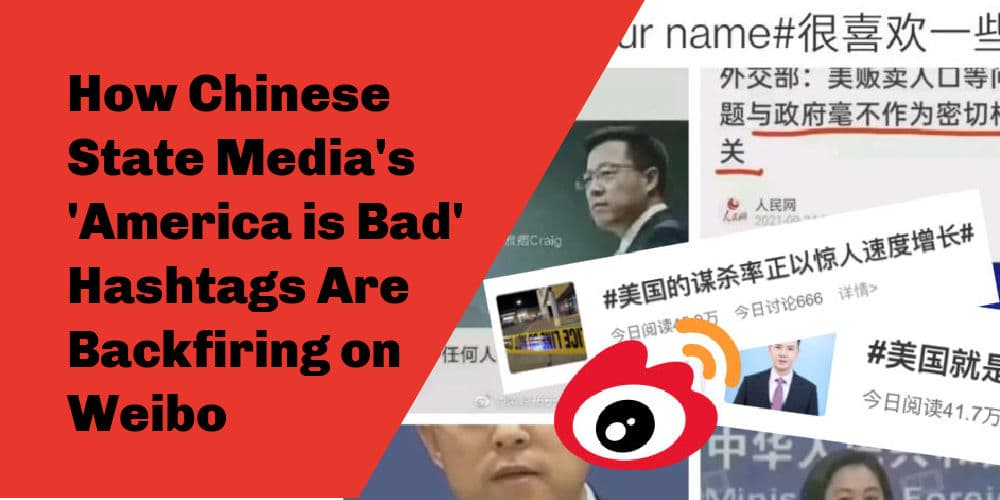
“America is Bad” Post Backfiring | Amid ongoing discussions about Chinese journalism and media, we have chosen this article from our archive to shed light on a noteworthy phenomenon. It examines how Chinese netizens effectively used state media reports as a platform to express their frustrations and amplify their voices. In 2022, when the Chinese government faced criticism for its handling of the COVID-19 crisis and other internal matters, netizens cleverly harnessed state media-initiated hashtags that focused on alleged human rights abuses in the United States. By doing so, they effectively voiced their dissent against the government’s diversionary tactics. Notably, this allowed critical viewpoints to emerge on Weibo at a sensitive time, without immediate censorship.
Weibo Word of the Week
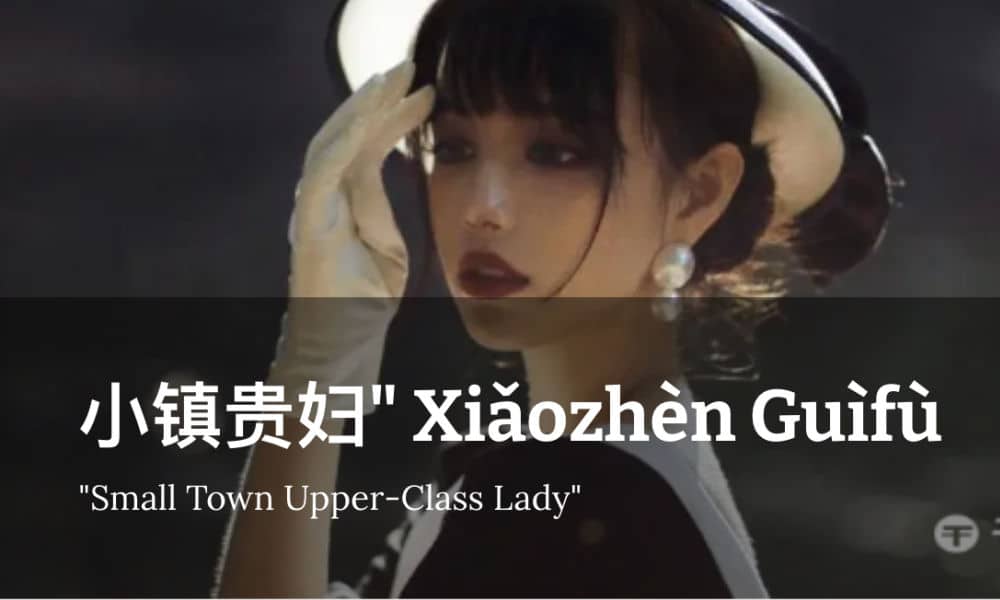
Small-Town Elites: Luxurious Lifestyle Away from the City | Our Weibo Word of the Week is 小镇贵妇 xiǎo zhèn guìfù, “small-town upper class lady.”
The phenomenon of the “small-town elites” has been popping up more frequently in Chinese online media and on lifestyle app Xiaohongshu over the past few months. The term “small town upper class ladies” (小镇贵妇) refers to women who reside in small towns and enjoy a wealthy lifestyle with minimal work responsibilities, usually thanks to their affluent families. Their wealth and leisurely lifestyle are not only due to financial stability but also the abundance of free time they have to engage in various activities, decorate their homes, and pursue hobbies such as yoga. This lifestyle is a striking contrast to urban dwellers who face long working hours, challenging commutes, and high living expenses.
While “small-town elites” may express their envy toward their friends in bigger cities who can attend concerts, visit bars, and experience the vibrant atmosphere of cosmopolitan places, they, in turn, are admired by their friends for their comfortable living situations and spacious houses in a relatively stress-free, privileged environment.
This is an on-site version of the Weibo Watch newsletter by What’s on Weibo. Missed last week’s newsletter? Find it here. If you are already subscribed to What’s on Weibo but are not yet receiving this newsletter in your inbox, please contact us directly to let us know.
The post Weibo Watch: Different Realities appeared first on What's on Weibo.